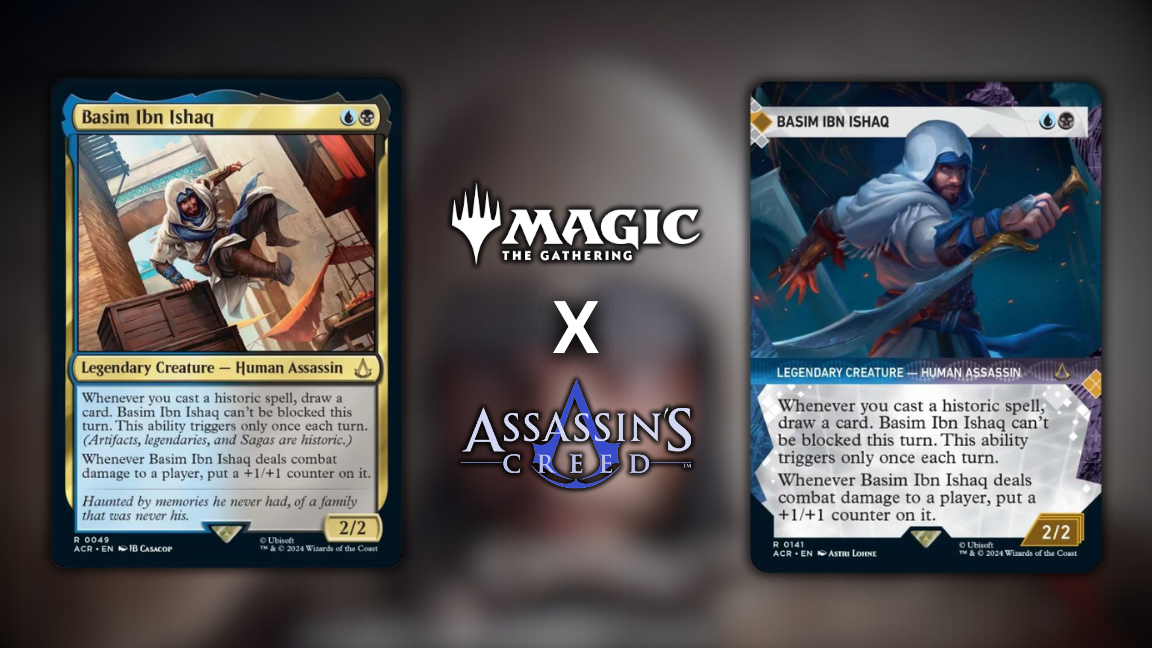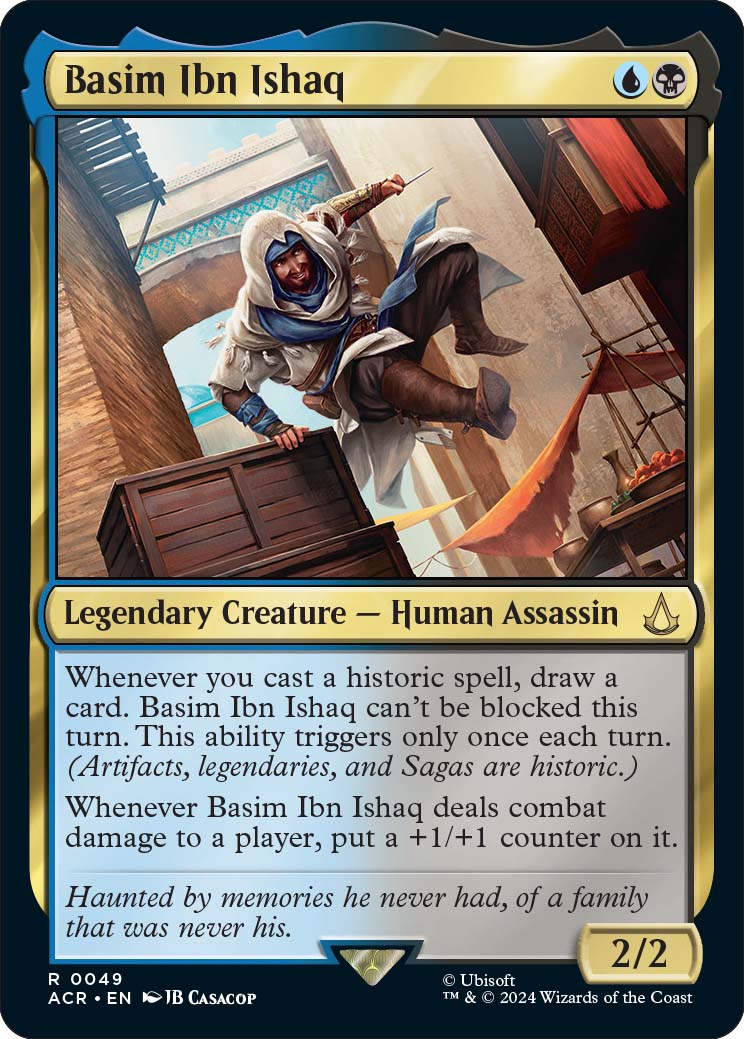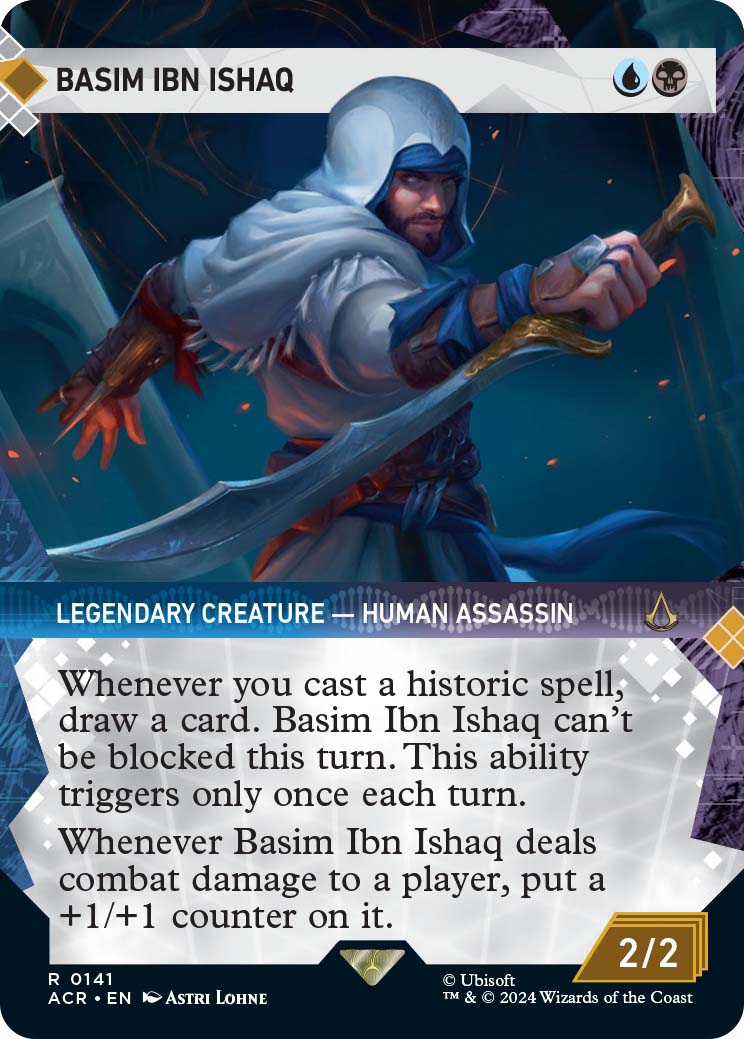Revealing Basim Ibn Ishaq, Our Assassin's Creed Preview Card!

It's said that you either die a hero or live long enough to become the villain. Christopher Nolan's quintessential Batman flick The Dark Knight says as much. But the concept behind the idea resonates far more universally than Christian Bale's portrayal of the Caped Crusader. We believe it is an apt quote to describe our free preview card from Universes Beyond: Assassin's Creed.
Our preview card is Basim Ibn Ishaq, the primary protagonist of Assassin's Creed: Mirage and a key antagonist of Assassin's Creed: Valhalla. This character is, put simply, a reincarnation of Loki and, of course, an Assassin.

A Character Overview of Basim Ibn Ishaq
Warning: there are major story spoilers ahead for a few of the more recent Assassin's Creed games. If you don't want to be spoiled, feel free to skip to the next section for card analysis.
Basim Ibn Ishaq was born in the 9th Century A.D. He was the orphaned son of the disgraced architect Ishaq and a woman whose name has been lost to time. For years, Basim was plagued with nightmares of a djinn and memories of an entire other life. His best friend in childhood, Nehal, was actually a mental manifestation of his repressed memories of a past life. In this past life, Basim was Loki. It's relevant to note that gods in this universe are known as the Isu and are a long-lost race that predate humanity by a long time. The djinn that haunted Basim's nightmares is a further manifestation of his memories as Loki.
In due time, Basim joined the Hidden Ones, the original guild of Assassins that form the crux of this series's intrigue. Eventually, his time with the Hidden Ones would lead Basim to Norway, where he pursued Sigurd Styrbjornsson, a figure who he thought to be the reincarnation of Odin (in actuality, this turned out to be Sigurd's foster sister, Eivor Varinsdottir, a fellow Assassin).
In Norway, Eivor, Sigurd, and Basim discovered an innumerably ancient Isu temple containing Yggdrasil, a supercomputer that saved some Isu back in 75,000 B.C.E. from a catastrophic global event. When Basim attempted to kill Sigurd, Eivor and Sigurd imprisoned Basim in Yggdrasil. In 2020, Basim escaped with fully acquired knowledge of the workings of humankind and technology alike. He regained his physical body with the help of an ancient legendary artifact called the Staff of Hermes Trismegistus and trapped Eivor's descendant in Yggdrasil. The rest, as they say, is history.

Playing Basim Ibn Ishaq as a Commander
Now that we've gotten a good feel for the duplicity of Basim's nature, let's discuss Basim in the context of Magic. Some things to consider when making a deck around Basim Ibn Ishaq as a commander are as follows:
- Basim is Dimir (blue and black)
- His mana value is two
- He works well with historic spells (artifacts, legendary spells, and Sagas)
- He can draw you cards and can evade blockers, getting +1/+1 counters on connection
With these notes in mind, Basim appears to work best as a commander dealing with artifacts. He's apt to begin swinging in on turn three, or sooner with an adequate ramp package available. In this deck, you're looking to play Lightning Greaves
Another route you can go with Basim is a Voltron-style strategy. Cards such as Quietus Spike
These options are just a few to consider when crafting a deck around Basim Ibn Ishaq as a commander.
Following the Assassin's Creed on a Budget
Given that I had a bit of time before publishing this article, I took the liberty of creating a decklist and goldfishing it several times a day. The decklist I've been playing with is fairly intuitive. I decided to go the Voltron route for Basim, erring toward Equipment, mana rocks, and a couple of legendary creatures to allow Basim to evade blockers. You can find my list at the end of this article.
This deck averaged a win in goldfishing trials between turns seven and ten, meaning it's not the fastest deck. However, not once did I draw into a copy of Sol Ring
These types of trial games always come with a disclaimer that, depending on how you're conducting them, they could take longer to achieve a win. However, assuming you're not deliberately durdling, these trials should serve as a fair metric for your deck speed.
The other disclaimer I want to emphasize bodes very well for Basim. My build has a budget of under $200, and, according to Archidekt, it clocks in around $190. If you were to put more fast mana and a competitive control package into this deck, it would certainly up the price point. That said, it would expedite the deck's clock by a good few turns, depending on how much you tune it.
Here in an Instant, Gone in a Flash
Some of the best cards for Basim include historic spells with flash. While you don't necessarily need instant-speed interaction to ensure you get your commander to connect, it's helpful if you want to maximize your draw power with Basim.
For a low-to-the-ground approach, we only want to pay special attention to historic spells with a mana value of three or lower. In this way, artifacts like Cogwork Wrestler
Beyond these, Equipment like Bladed Battle-Fan
For flash-enablers on the slightly higher end of the mana value spectrum, options include Teferi, Mage of Zhalfir
Basim in the 99
Of course, you don't have to run Basim as your commander. There are plenty of options wherein Basim works as a good beater in the 99. Again, let's consult some notes here. For one, he's a Dimir creature that works in builds that care about historic spells and permanents. Furthermore, he only costs two mana, meaning he's viable in decks that can run Lurrus of the Dream-Den
Nothing is True, Everything is Permitted
Do you have plans to make a Commander deck based on Assassin's Creed: Mirage's protagonist, Basim Ibn Ishaq? If so, we would love to know if there are any strategies we missed along the way. A big thank you to Wizards of the Coast for providing this preview from Universes Beyond: Assassin's Creed!
A Mirage
View on ArchidektCommander (1)
Artifacts (33)
- 1 Amorphous Axe
- 1 Andúril, Narsil Reforged
- 1 Arcane Signet
- 1 Chromatic Star
- 1 Cranial Plating
- 1 Dimir Signet
- 1 Everflowing Chalice
- 1 Fireshrieker
- 1 Hammer of Nazahn
- 1 Hero's Blade
- 1 Hidden Blade
- 1 Lavaspur Boots
- 1 Lightning Greaves
- 1 Lost Jitte
- 1 Masterwork of Ingenuity
- 1 Mind Stone
- 1 Mishra's Bauble
- 1 Mithril Coat
- 1 Nuka-Nuke Launcher
- 1 Prismatic Lens
- 1 Prowler's Helm
- 1 Quietus Spike
- 1 Resurrection Orb
- 1 Scytheclaw
- 1 Sol Ring
- 1 Swiftfoot Boots
- 1 Talisman of Dominance
- 1 Tarrian's Soulcleaver
- 1 The Irencrag
- 1 The Key to the Vault
- 1 Tormod's Crypt
- 1 Trailblazer's Boots
- 1 Whispersilk Cloak
Creatures (22)
- 1 Ancestral Statue
- 1 Baleful Strix
- 1 Burnished Hart
- 1 Changeling Outcast
- 1 Dimir House Guard
- 1 Drift of Phantasms
- 1 Emry, Lurker of the Loch
- 1 Etherium Sculptor
- 1 Flux Channeler
- 1 Forensic Gadgeteer
- 1 Foundry Inspector
- 1 Magnetic Snuffler
- 1 Memnite
- 1 Ornithopter
- 1 Ornithopter of Paradise
- 1 Phyrexian Walker
- 1 Ramses, Assassin Lord
- 1 Shield Sphere
- 1 Shimmer Myr
- 1 Silas Renn, Seeker Adept
- 1 Tribute Mage
- 1 Universal Automaton
Lands (38)
- 1 Archway of Innovation
- 1 Bojuka Bog
- 1 Buried Ruin
- 1 Choked Estuary
- 1 Command Tower
- 1 Drowned Catacomb
- 1 Evolving Wilds
- 1 Fabled Passage
- 1 Fetid Pools
- 9 Island
- 1 Maestros Theater
- 1 Morphic Pool
- 1 Obscura Storefront
- 1 Promising Vein
- 1 River of Tears
- 1 Rogue's Passage
- 1 Shire Terrace
- 1 Spymaster's Vault
- 1 Sunken Hollow
- 8 Swamp
- 1 Tainted Isle
- 1 Terramorphic Expanse
- 1 Underground River